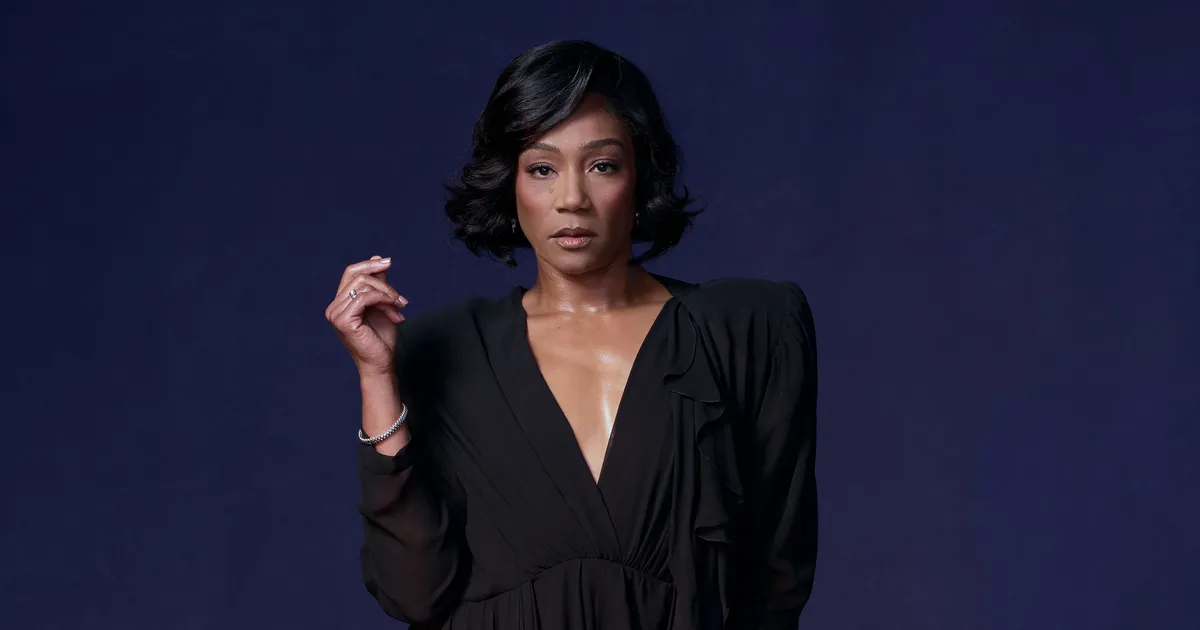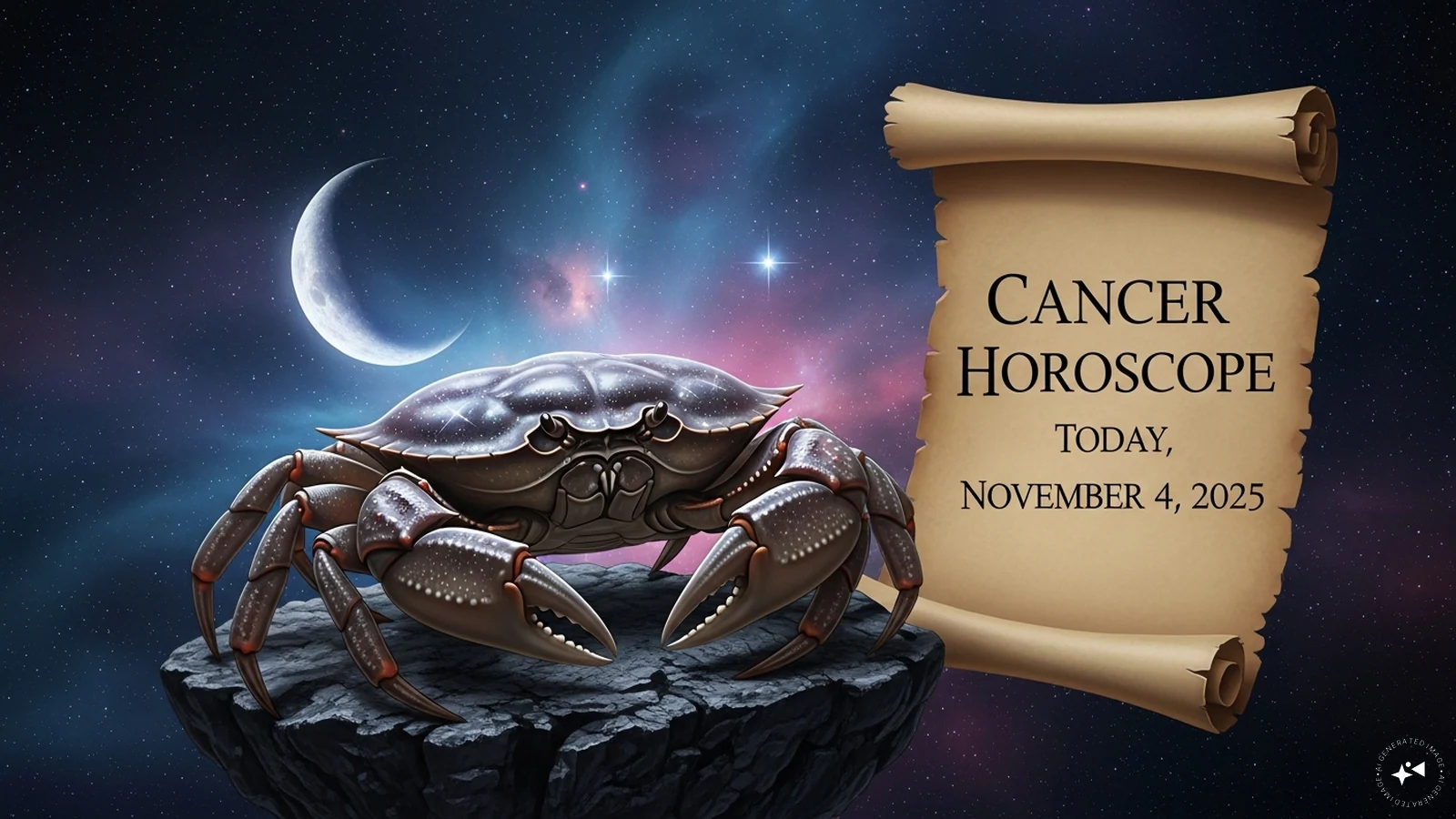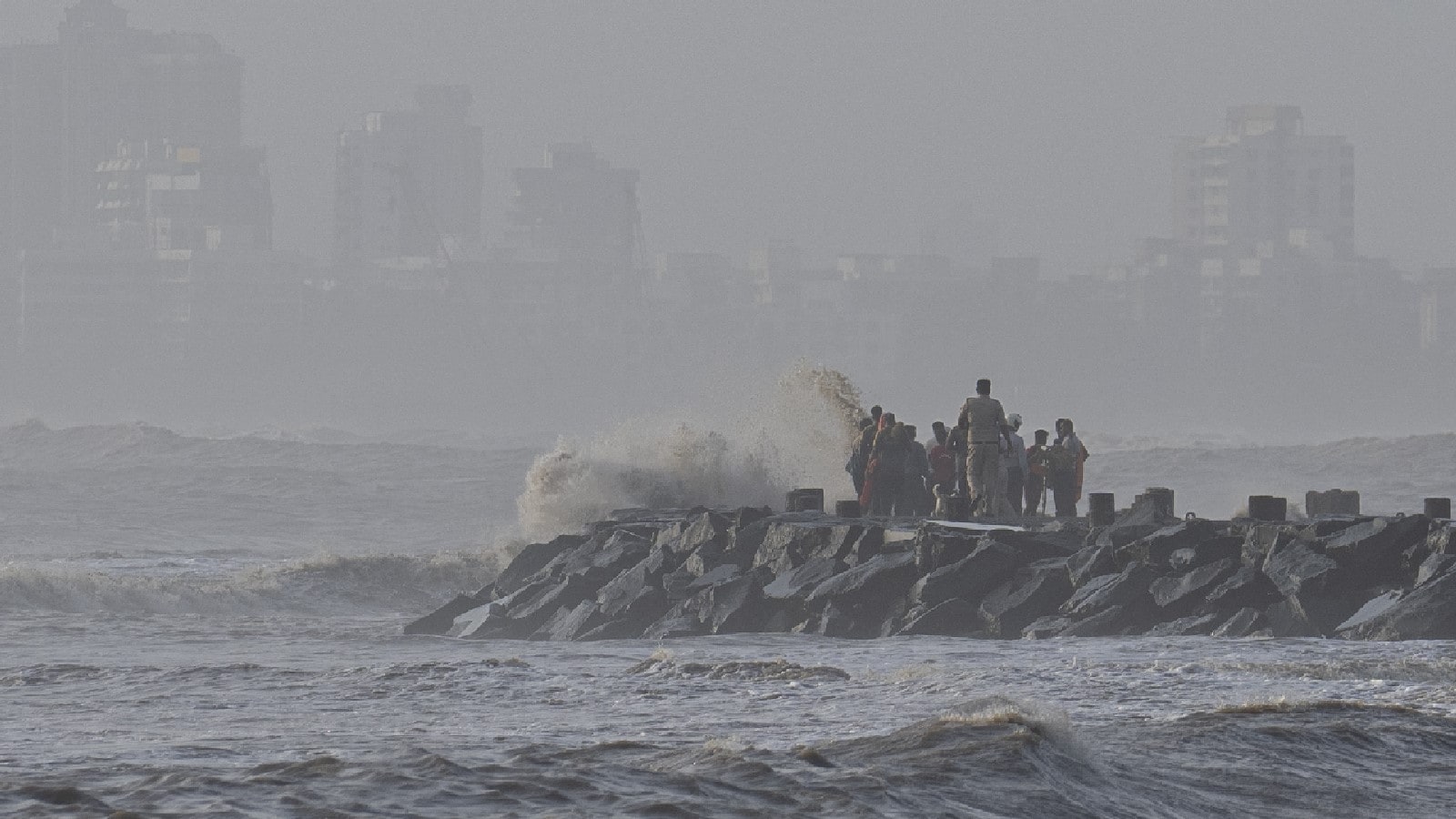Copyright Vulture

Tiffany Haddish stands backstage at the El Capitan Entertainment Centre in Los Angeles wearing a pair of camera glasses. “I did a campaign with Ray-Ban once, and they were supposed to give me a pair of these, but they never did,” the 45-year-old actress and comedian says, checking her reflection in a full-length mirror. “If there’s one thing I can’t stand, it’s when people don’t keep their promises.” Her voice cracks a little as she turns to me and whispers, “Foster-kid shit.” It’s a sunny August afternoon and Jimmy Kimmel is on vacation, so Haddish is guest-hosting his late-night program. Her glasses are recording behind-the-scenes footage for Kimmel’s website mere weeks before ABC will abruptly suspend production under pressure from the Trump administration. For now, it’s the calm before the storm — Kimmel has yet to accuse MAGA loyalists of “trying to characterize this kid who murdered Charlie Kirk as anything other than one of them,” and his show is an early stop on what appears to be a comeback tour for Haddish. Haddish has been a fan favorite on Jimmy Kimmel Live! since 2017, the year she rocketed to the Hollywood A-list with her breakout performance as Dina, the Zach Galifianakis–type wild card in Malcolm D. Lee’s Hangover-esque comedy Girls Trip, about four women — played by Haddish, Jada Pinkett Smith, Queen Latifah, and Regina Hall — on a debaucherous New Orleans getaway. Before her ascent, Haddish was a touring comic and little-known actress most familiar for her supporting part on the sitcom The Carmichael Show — one for which, as with Girls Trip, she had not been the first choice. The original actress hired to play Nekeisha, the rough-edged ex-wife of the main character’s hustler brother, Bobby, was doing a stage play that forced her to miss rehearsals, so Haddish was brought in to read for the role. She quickly charmed the cast with her rowdy, life-of-the-party energy. “When the original Nekeisha came back, Loretta Devine was like, ‘I miss Tiffany,’” says Lil Rel Howery, who played Bobby. A similar path brought Haddish to the attention of the Girls Trip producers. People she had befriended in the industry secretly kept sending her the script even as other actresses, including Leslie Jones and Niecy Nash, were being eyed for the job, so convinced were they that Haddish’s raunchy brand of comedy was a better fit. “Every time I looked at Tiffany’s audition tape, it made me laugh,” recalls Lee, the director. The results were like being “shot out of a cannon,” Haddish says of the rapturous response to Girls Trip. “She was just such a force in that movie,” says comedian Ali Wong, who later co-starred with Haddish in the animated series Tuca & Bertie. “Everybody and their mother wanted to work with her.” Haddish had auditioned for Saturday Night Live multiple times and been turned down. Now, SNL was asking her to host the show. (Haddish accepted — and became the first Black woman to win an Emmy for doing so.) Netflix signed on to produce her next comedy special. That same year, in 2018, she was chosen as a cover star for Time magazine’s “Time 100” issue, which featured the likes of Nancy Pelosi, Emmanuel Macron, and Jeff Bezos. It was a career-high watermark that Haddish has not again reached. She landed a few promising roles after Girls Trip — Night School opposite Kevin Hart, Like a Boss alongside Rose Byrne and Salma Hayek — but few left much of an impression aside from the critically acclaimed Tuca & Bertie, which got canceled twice. The pandemic caused many Hollywood productions to slow down, including the shoot for Paul Schrader’s drama The Card Counter, in which Haddish played Oscar Isaac’s handler turned love interest. Meanwhile, Haddish’s off-camera behavior started to erode her goodwill. While guest-hosting The Ellen DeGeneres Show in 2020, Haddish interviewed her friend Marlon Wayans and asked why he had never cast her in a movie. “Sometimes, you just be inappropriate,” Wayans said with affection. “Like, it’s a love scene and you wanna sit on the actor’s lap and fart.” “She’s like that kid at school that could distract all the other kids,” says Howery, who recently cast Haddish in his feature directorial debut, Haunted Heist. “When she start playing around, we just ignore it so we can finish what we doing.” Both men say they love her and believe she’s a tremendous talent. “She’s definitely matured,” Wayans tells me. “With maturity, we all learn that the best comedy is appropriately timed.” Haddish spent most of the early pandemic alone at her house in South Los Angeles, nursing a knee injury and performing stand-up for her backyard plants. The doldrums persisted even after the industry reopened: In 2021, Haddish’s boyfriend of more than a year, the rapper-actor Common, broke up with her over the phone. On New Year’s Day 2022, her dog died, followed closely by the grandmother who helped raise her and her four younger siblings after their mother lost custody of them. One of her mentors, the comedian Bob Saget, died the same week, after falling and hitting his head in a Florida hotel room. Days later, Haddish was arrested in Peachtree City, Georgia, for allegedly driving under the influence (she was arrested again for the same thing in November 2023). In September, Haddish was named with fellow comedian Aries Spears in a lawsuit alleging they sexually abused two children in a pair of skits, including a 2014 sketch called “Through a Pedophile’s Eyes.” The suit was withdrawn less than a month later, and the children’s mother — a former friend of Haddish’s — was ordered to pay the comedian nearly $100,000 in related legal-fee compensation. But the damage to Haddish’s reputation in Hollywood seemed fatal. “I lost everything,” she told TMZ at the time. “All my gigs are gone.” Now that three years have passed, Haddish tells me this feeling of despair was temporary. “I felt like I lost a lot of work, but actually things just paused and then picked up again,” she says. “Two weeks later, I’m back on set.” While it’s true that her IMDb résumé shows no gaps from that period, some of her recent bookings still look like she’s trying to reintroduce herself to a wary public. Later tonight, she’s scheduled to play the Laugh Factory for L.A. Comic Con’s Nerd Night Out. In November, she premieres Tiffany Haddish Goes Off on Peacock, a reality travel show featuring her and her three childhood friends that’s a clear bid to recapture that Girls Trip magic. But Haddish doesn’t see it as a comeback; professionally, at least, it’s business as usual. What has changed, she tells me, is her personal life. “The thing that contributed to that feeling of losing everything is that people I had working really close to me, who said they were going to protect me, didn’t even answer the phone,” she says. “I figured out who my real friends are” — and jettisoned the fake ones. She quit drinking two years ago, crediting that decision with deeper sleep and better eye contact. She’s exercising a lot, mostly barre, and relying more on her gut when it comes to trusting people. She means this literally: For most of her life, Haddish — a survivor of abuse and homelessness — has misinterpreted needy and controlling behavior as love. “Now, if I feel any little rumble in my gut, I gotta go. Every time I was around this heifer,” she says, referring to the former friend who tried to sue her, “my stomach hurt. I got gas.” Haddish’s reliance on this physical cue comes up several times when we meet. We’ve been talking for just over an hour when, without prompting, she announces she has reached a verdict about me. “I don’t feel like I got gas with you,” she says. “My stomach don’t hurt.” My first clue that Haddish’s stomach may be leading her astray comes during the Kimmel taping. One of the things she appreciates most about her weeklong stint as host is that she has creative control. This wasn’t always the case when she did late-night TV. When she hosted SNL, she had to fight to get her ideas taken seriously by the writers. “I was pissed,” she wrote in her memoir, I Curse You With Joy. Kimmel is a total 180. “I enjoy feeling safe and free to say what I want,” she tells me. “Even though they give me these guidelines, they’re like, ‘Here’s what we want you to say — but you can do anything in that realm.’” Part of this freedom means Haddish gets to choose some of her guests. Earlier in the week, she had Selena Martin, Shermona Long, and Shermona’s younger sister, Sparkle Clark, with whom she traveled to South Africa, Zimbabwe, and Tanzania in the summer of 2024 for Tiffany Haddish Goes Off. (They had to skip Eritrea, where Haddish’s father was born, because of U.S. travel restrictions and safety concerns.) Today, she’s giving two of her middle-school teachers, Mr. and Mrs. Jones, a 50th-wedding-anniversary gift by inviting them to the taping. This is Haddish’s grand finale on Kimmel, so the people she’s interviewing — Jessica Williams, fresh off her Emmy nomination for Shrinking, and Mark Rober, a former NASA engineer turned YouTuber with more than 71 million subscribers — are accordingly well known. Then there’s Stephen J. Cloobeck. “Stephen is running for governor of California,” Haddish tells the slightly bewildered audience as she introduces the squat gray-haired man sitting near the stage as “my friend.” Cloobeck is the 64-year-old former CEO of the time-share company Diamond Resorts and a Democratic donor who isn’t afraid to throw his weight around; in 2017, he went on MSNBC and threatened to stop giving the party money if its candidates criticized rich people. (“If you use the term billionaires again, I’m done.”) Cloobeck is rich but not famous enough to be recognized by his own employees on Undercover Boss, on which he has appeared multiple times. Haddish tees him up to brag about his philanthropic work — “We took care of the people in Altadena that are hurtin’, ” he says — then invites him onstage where, in a seemingly endless, profoundly cringe-inducing 15-second segment, she teaches him how to do the Nae Nae. “I trust you, Stephen,” she says with a chuckle as Cloobeck returns to his seat. Later, I ask Haddish how Cloobeck managed to earn her endorsement. “I’ve been seeing him at parties for years,” she says. Eventually, she started picking his brain about real-estate investment — she owns several properties — and when he floated the idea of running, she told him, “I got your back.” “I feel like running a government is like running a corporation,” she says. “He’s good at customer service. Excellent. Every resort I’ve ever stayed at that he owned.” Politics is not the only area in which Haddish treats being good with money as indicative of general trustworthiness. In another segment of the same Kimmel episode, she deploys production staffers to Hollywood Boulevard to trawl for potential boyfriends. When she interrogates the candidates, one of her go-to questions is “What’s your credit score?,” disqualifying anyone in the 600s or below from her “possible penis pen.” I ask about this later, in part because a man’s credit comes up in her memoir, too, as key when considering a romantic partner. “I don’t trust people with low credit scores,” she says. “The bank wouldn’t give me a loan if my credit score was under 625, so why would I loan my body and time? We are in a capitalist country, and there has to be some gain of some sort — even though I don’t personally feel like that’s true. When you meet people, they want to gain something off you, whether it be an experience, a laugh, a hug, your money, your soul.” If Haddish’s trust meter seems off, a lot of it can be chalked up to her horrific childhood. Her father, a Jewish Eritrean immigrant who came to the U.S. as a war refugee in the 1970s, abandoned her and her mother when Tiffany was 3. When Haddish was 8, her mom left home for a night shift and didn’t come back; two days passed before Haddish learned her mother had sustained a critical brain injury in a near-fatal car collision. When her mother regained consciousness, she was in the hospital with almost no memory — and a completely different personality. Haddish had formerly considered her mother a reliable presence; now, not only did she have to relearn how to walk and speak, she was suddenly frighteningly vicious toward her eldest daughter, cursing and beating Haddish relentlessly and calling her ugly and stupid. She was diagnosed with schizophrenia and institutionalized when Haddish was 13. She and her siblings spent the next five years shuffling between foster homes, where she was physically and sexually abused. Each move brought new feelings of unwantedness; she had a stepfather at the time, her mom’s husband, but he only made things worse — at one point, he claimed to have tampered with her mother’s car, causing the collision that nearly killed her. (Haddish has tried investigating this claim, to no avail.) Her grandmother got custody of her and her siblings when Haddish was 14 but kept them in the foster-care system because she was too poor to provide for them. By then, Haddish had developed a warped sense of self-worth that dogged her into adulthood. She met her future husband, a cop turned private detective named William Stewart, on a cruise ship after she caught him secretly filming her, mistaking his creepiness for adoration. He gained her trust and gratitude by locating and reuniting her with her father. But she alleges Stewart was also abusive and controlling, punching and choking her and using his surveillance gadgets to track her. (Stewart has denied these claims.) In 2013, Haddish divorced him. A few years later, her father disappeared again; they had overcome their estrangement, but his shame at having abandoned her seemed ultimately to overwhelm him. In 2017, he died from heart failure. A few hours after Kimmel wraps, Haddish and I meet at the Laugh Factory, one of Hollywood’s premier comedy clubs. This is where Wayans and his brother Shawn first met her back when she was a loudmouthed 16-year-old taking the bus from South Central to attend comedy camp. (She tried unsuccessfully to make a pass at Shawn, according to Marlon.) The Laugh Factory was a refuge of sorts; Haddish’s social worker had secured her a spot in the company’s youth camp as an alternative to psychiatric therapy, a decision Haddish credits with saving her life. Nerd Night Out, the event Haddish is headlining, is as geeky as it sounds. The host is a man dressed as a goblin — long nose, green makeup, pointy ears — who goes by “John Goblikon.” Haddish has been on his podcast before. “He’s good people,” she tells me. But when she is called to the stage, it’s not to do stand-up, as she’d expected, but a sit-down interview with Goblikon. She interprets this pivot as a betrayal, promptly picking a fight with the host over who gets which chair. “I hate a bait and switch,” she tells me later. Part of this is about basic professionalism — she says Goblikon sent her a long text afterward apologizing — but it’s also about Haddish’s easily triggered hang-ups around safety. “I feel really safe onstage,” she says. “I know if somebody tries to do something to me, I got a roomful of witnesses.” I think sometimes her thirst for laughter can negatively affect her,” Marlon Wayans says of Haddish. “Tiffany just doesn’t give a fuck — and that’s both a gift and a curse.” Part of the gift is her willingness to breach decorum if she thinks it’ll put others at ease. When we first meet backstage at Kimmel, she spends several minutes relaying flirtatious messages to me from her hairdresser at full volume. (“He says you got a nice haircut! He says you smell good!”) “She only does that stuff because she wants everybody to be comfortable. She like putting a smile on somebody’s face,” Howery tells me. But there are times when this behavior verges on trollish attention-seeking. In September 2024, on a dare from her New York Fashion Week seatmate Kathy Hilton, Haddish strode onto the runway during a Monse show, which some observers found amusing but others considered disrespectful. In August of this year, Haddish, who has struggled publicly with endometriosis, posted photos of herself and her friend Jason Lee, who is gay, with a baby she implied they had had together; it turned out to be a bizarre stunt to raise awareness about adoption. Then there’s the 2014 sketch that landed her in legal trouble. Haddish stresses to me that she had nothing to do with writing, producing, or editing the video, and she appears in none of its most objectionable scenes. The finished product — which can be viewed in redacted form on YouTube — is in such obviously poor taste that Haddish had been trying to get it scrubbed from the internet for years before the lawsuit. (Funny or Die, where it lived most prominently, eventually took it down.) The sketch features Haddish as a busy mother who leaves her son alone with his uncle, played by Spears, who she doesn’t realize is a pedophile. Several of the scenes are shown from the uncle’s point of view and depict the child in various states of undress, including in a bubble bath, each seemingly innocent scenario taking on a dark, sexually suggestive tenor as Spears’s character fantasizes about him. “I did not like it,” Haddish tells me. “That looked very different from the script.” Yet even if Haddish had been unaware of how bad it was, it’s hard not to see her participation as evidence of a broader lack of judgment. She helped cast the child, after all — though she says she did so as a favor to his mother, whose family Haddish helped support financially and who apparently wanted to put together a reel to get her kids into show business. At its worst, Haddish’s desire for validation makes her susceptible to the influence of some truly odious people. In 2018, Haddish traveled to Eritrea; she was photographed posing and smiling with Isaias Afwerki, the brutal dictator who has ruled the country since its independence from Ethiopia in 1993. Afwerki routinely imprisons his critics and political opponents and has implemented a policy of indefinite mandatory military and national service for residents, which human-rights watchdogs say amounts to slavery. In 2019, Haddish went back for a second time and became a naturalized citizen, gifting Afwerki a copy of her essay collection, The Last Black Unicorn, before returning to the U.S. “My brother, my president, thank you for doing what you do,” she reportedly wrote in the inscription. Backlash from the Eritrean diaspora was swift. Many accused Haddish of laundering Afwerki’s record, and she agreed to address their criticisms in a Twitter conversation with a group of mostly Eritrean American young people. It did not go well. Haddish expressed what seemed like an earnest willingness to learn, but she admitted to falling asleep while reading through the comments. Afwerki, she offered as a counterpoint to their arguments, “gave me honey from his farm.” She said she “was saying ‘thank you’ because he is building dams and trying to bring electricity to villages. At least that’s what I was told.” When I ask her about this exchange, Haddish says she is grateful for the young people who engaged with her. But she also feels their analysis wasn’t quite fair — none of them had to live through the wars that brought Afwerki to power and drove her father out of the country. “I get why they’re critical,” she says. Afwerki has “made not the best choices. But he’s protected his whole nation, in a way.” Haddish likens the president to the “leader of a gang that’s just trying to protect his gang,” but she bristles when I use the word dictator. “I’ve never seen a dictator wear Velcro sandals in an old-ass 2012 Toyota 4Runner, just stopping at villages and talking to people and handing me peaches,” she says. “And if he did that special for my benefit, well then kudos to me, bitch. I’m important.” She says this half-jokingly, but Haddish — who says she is big on seeing things with her own eyes before casting judgment — can be shockingly credulous about what people with an agenda choose to show her, especially if they are nice to her. She seems particularly easy to persuade where safety is invoked. In February 2024, she visited Israel — Haddish converted to Judaism when she was 40, two years after her father, who was Jewish, died — reasoning that she’d get a less filtered view of the region while a war was going on. In reality, as for most visiting celebrities, her itinerary was narrowly circumscribed. She went to Tel Aviv, Haifa, and — her personal favorite — Dimona, home to descendants of the Black Hebrew Israelites who settled there in the 1960s. “It’s a place where we can all be in harmony together,” she claims, though, she adds as a caveat, “I was only there for a few hours.” I ask if she visited the Palestinian territories. “I wanted to go,” she says. “But they wouldn’t let me.” The blinkered view she got instead — of massacred kibbutzim and Hamas rockets detonating in the sky — was so defining and vivid that her voice cracks and her eyes fill with tears while describing it: “Death. Burning buildings. You could still smell it.” Part of what makes Haddish such a gifted actor is her full-body recall, an astonishing phenomenon to witness, as I did several times while speaking with her. Every difficult or traumatic experience she has ever had seems to lurk right below the surface, threatening to burst forth. “When I tell you” about this stuff, “it’s not just in my mind,” she explains. “I can feel the feeling, like my whole body’s there.” By the time organizers of last November’s pro-Israel “Stand Together” rally in Washington, D.C., asked Haddish to emcee their event, at least 43,000 Gazans had been killed by the IDF, Israel’s genocidal designs on Palestine were clear, and the country’s apologists needed someone loud and impressionable to reframe the conflict. “We have U.S. soldiers and IDF heroes with us today, Israeli artists and American performers,” Haddish proclaimed from the podium. “That is what Jewish unity looks like.” “I don’t regret it at all,” Haddish says when I ask if any developments over the past year have changed how she feels about headlining the rally. She adds that she doesn’t support Israel’s government, only its people — a tough distinction to square with her praise of “IDF heroes.” Part of why she does stand-up, she says, is to correct her own misconceptions. “It’s like, I had this belief, I say it out loud, and the audience might go” — she gives me a quizzical look — “and I’ll be like, Oh, what’s that about? And then, bam, I just learned something new.” The word her friends and peers keep using to describe her is honest, and it’s clear she isn’t afraid to be seen as ignorant when she doesn’t understand something. Less clear is whether the safety she feels onstage is due partly to her feeling less accountable to other people when she’s up there. Not that Haddish loses sleep over such questions. “I might get beat up a little bit in the process, and people might say, ‘I’m done,’” she tells me. “But whatever. I got multiple roofs over my head. I’mma be all right.” We’re sitting under one of those roofs right now, in the middle house of three she owns side-by-side on the same unassuming block in South Los Angeles. This one’s for entertaining; the other two are where she sleeps and where her cousin lives, respectively. Haddish feels safe here, which surprises some of her celebrity friends. Kevin Hart has encouraged her to move, but Haddish points to Arsenio Hall’s house — which is in a fancier area — getting broken into twice as vindication. “Thieves go where the treasure’s at,” she says. Haddish spends a good chunk of our interview telling me about the byzantine neighborhood feuds that are apparently unfolding around us as we speak; she’s personally beefing with a Realtor neighbor who tried to attract buyers by giving them Haddish’s address. “I feel like Tiffany doesn’t really see herself as a famous person,” says Shermona Long, one of the Tiffany Haddish Goes Off crew. “She has sorted out a way to really continue to keep herself grounded” — doing her own laundry, cleaning her own house, and taking regular Sunday walks at the beach with her oldest friends, whom she has known since they were teenagers. These friends provide a crucial tether to reality for Haddish. The resulting docuseries is like if the Girls Trip characters had a supersize budget complete with a private chef, multiple international flights, and a shark-cage-diving expedition. By the time they get to Zimbabwe, the final leg of their trip, Haddish has admitted several times to feeling stuck despite her success, in part because her romantic relationships all seem doomed. She decides to put on a fancy outdoor ceremony during which she walks down a wedding aisle wearing a formal green dress, stands across from a mounted mirror, and gets married to herself. In one sense, it’s all a big joke; Haddish’s friend Sparkle Clark officiates — “We are gathered here today to celebrate the love of Tiffany and Haddish” — while Haddish reads her prepared vows in two different voices, a feminine one and a deeper, masculine-sounding one. But Haddish also sees the ceremony as a way to double down on her most important relationship. “It’s really hard to love yourself,” she says into the camera, “because you know what your shit smell like.”



